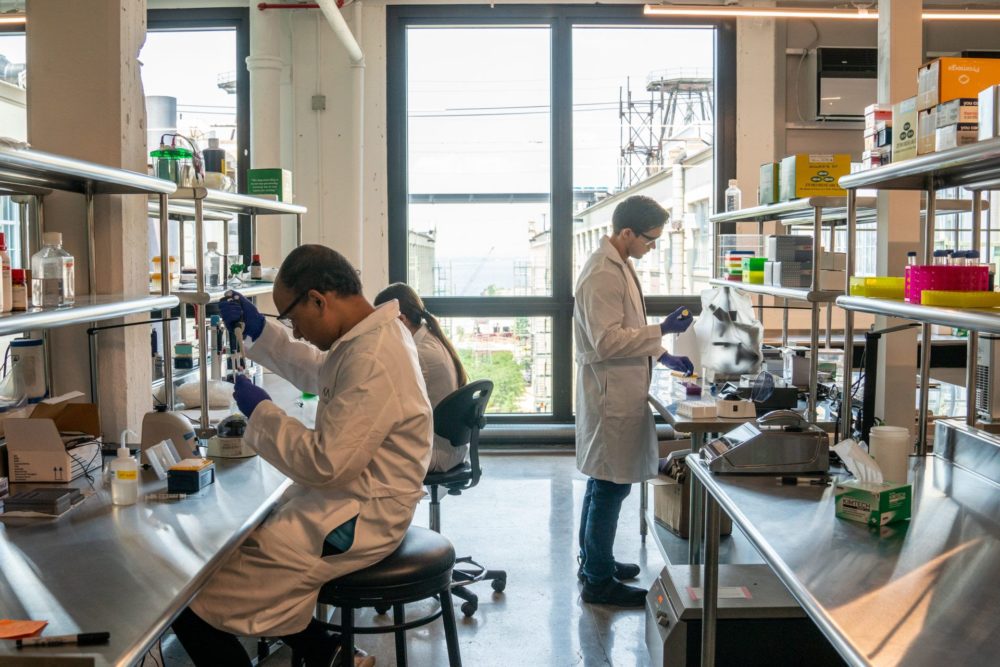US synthetic biology startup Aanika Biosciences has made a $12 million initial close of its Series A round led by Jon Cholak, managing director at Adit Ventures, along with existing investors Draper Associates and SOSV.
The company will use the funding to scale up its platform that develops traceable, microbial tags for food items. Funds will also go towards accelerating research and building a larger manufacturing facility in its hometown of Brooklyn, New York.
Aanika was founded in 2018 under the name Carverr, before rebranding in 2020. Its edible microbial tags can be applied to food products to act like watermarks, enabling more precise traceability as food moves through the supply chain. These tags are essentially groups of microbes customized to each shipment and are applied as a spray during the early stages of the supply chain journey. The tags are designed to last throughout the lifecycle of the product they are applied to; as such, even problems that arise at the consumer-facing stage, such as at a restaurant chain, can be traced back to their original source.
The startup’s chief science officer Ellen Jorgensen says this level of precision in traceability can have dramatic impacts in areas including health, trade, and the reputation of the food company or business.
Aanika’s tech “reduces the time and resources needed to track the source of an outbreak,” she tells AFN, allowing a pathogen or other issue to be “contained and controlled because you can trace it back to the source farm and then figure out exactly what to pull from the shelves.”
Right now, Aanika largely targets insurance companies as its key customers. The startup is tight-lipped about developments here, though founder and CEO Vishaal Bhuyan notes that insurance companies in particular can benefit from greater traceability and protection because they’re the ones paying the claim in the event of, say, an E. coli outbreak in a shipment of romaine lettuce.
Secondary functions to fight climate change
While food safety and pinpointing the origin of food-borne illnesses is the obvious application for its technology, Aanika is also exploring secondary functions for its platform. One possible scenario is to add anti-fungal properties to its microbial tags that could help fight food spoilage.
“There’s an environmental angle to this traceability,” Bhuyan tells AFN. “The big thesis here is that with climate volatility you’re going to have more food spoilage, and the reason for that is you’re basically going to have microbes and little critters popping up in places that aren’t prepared for it.”
It is still early days for these secondary uses when it comes to Aanika’s platform, but Bhuyan says the company is already looking at creating peptides to mix with the microbial tags to improve loss prevention. Traceability and prevention, he believes, “are the two ways we can secure the food system.”
Jorgensen says the company envisions an entire suite of tools in the future that could address climate-related issues, from fungus and crop disease to bacteria from washwater, to name a few examples.
Simulating supply chains in the lab
For a number of regulatory reasons Aanika does not yet trial its microbial tags in the field. Instead, the company works in controlled lab environments that can help researchers understand how the tags perform under different conditions. That’s why it’s using a big chunk of its Series A funding to expand its Brooklyn location almost tenfold.
“We’re going to have grow facilities where we can simulate plants in the field and look at different applications and how they work. We’re going to have isolation areas where we might even be able to test things that could potentially alleviate plant disease,” says Jorgensen of the enhancements to the facility.
“Agriculture is is a massive scale business and we want to get as close to that as possible when we’re developing our products,” she adds.
Aanika has only tested its microbial tags on leafy greens so far. But as the company grows – thanks in no small part to this funding round – testing other food products will become more of a possibility, according to Bhuyan.
“This will be the first time we actually have enough hands to explore multiple opportunities,” he says, adding that Aanika has been approached by major coffee and cacao producers as well as grain processors and confectionary manufacturers.





